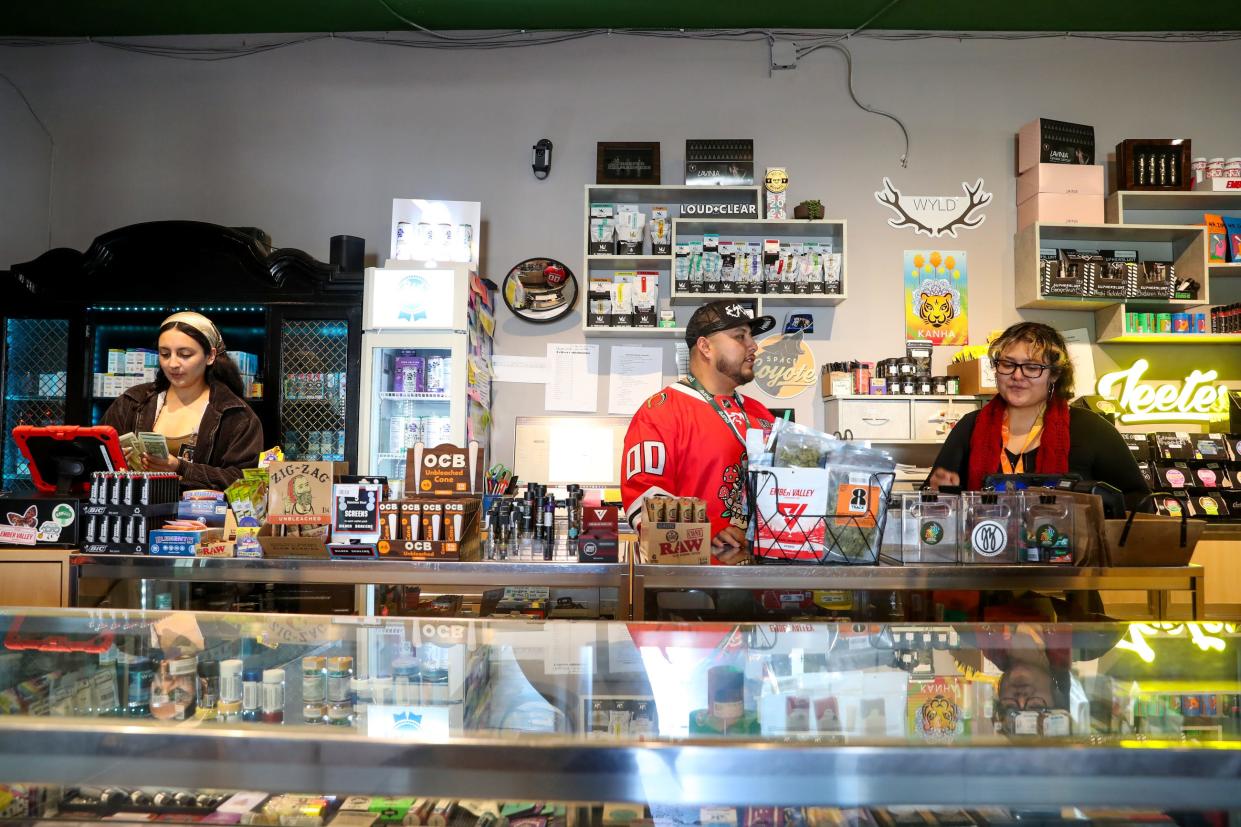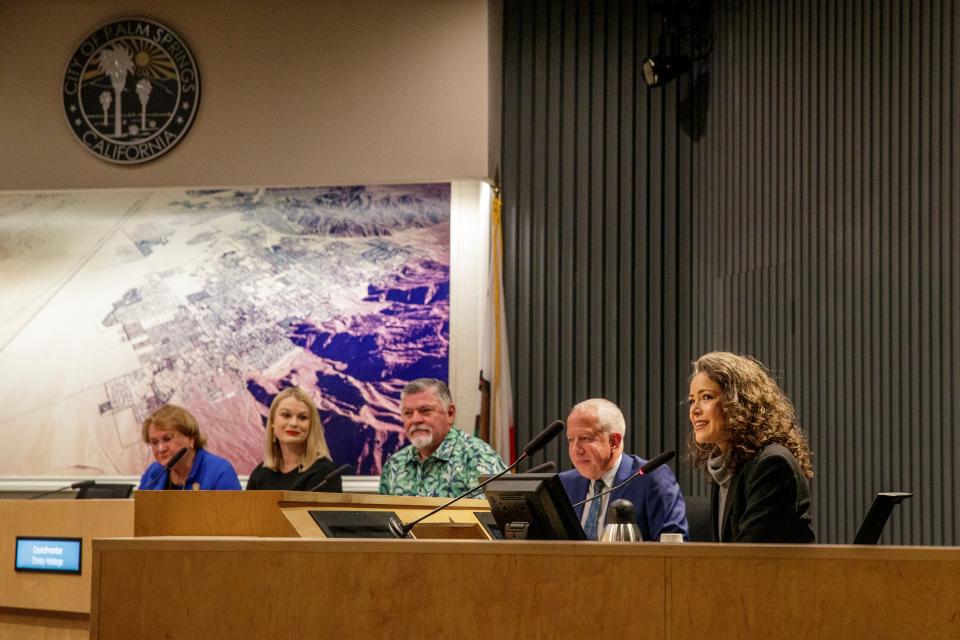Palm Springs council cuts cannabis taxes, extends moratorium on new dispensaries

With the Coachella Valley’s cannabis industry facing what local officials and business owners describe as a struggling, oversaturated market, the Palm Springs City Council opted Thursday to cut retail taxes for marijuana sales in half while extending a moratorium on new dispensaries for four years.
The 4-0 vote during Thursday’s meeting came several months after the council agreed to place a short-term moratorium on any new cannabis dispensaries that was later extended until October 2024. The Thursday vote extends that much longer, until 2028.
The council also decided Thursday against placing a cap on the number of permitted dispensaries within city limits for now, and it also opted against implementing any distribution taxes on cannabis companies, after several stakeholders pushed back on the idea.
Palm Springs has 26 operating dispensaries, along with eight that are permitted but not currently operating and another pending, which online data suggests makes it one of the most dispensary-saturated cities on a per capita basis.
But tax revenue from dispensaries has dropped for two straight years and is down substantially from the high it reached during the COVID-19 pandemic. Several dispensaries have also closed over the past two years even as the city has added more.
The question of how to keep the legal markets afloat has been discussed by councils across the Coachella Valley in recent months. Just this week, the Desert Hot Springs City Council took steps toward a permanent reduction in that city's taxes on marijuana cultivation based on square footage.
More: Does Palm Springs have too many marijuana dispensaries? Once-booming industry faces trouble
What business owners said
The council heard from several stakeholders in the local cannabis industry Thursday night who supported cutting the retail tax, though they offered mixed opinions on some other initiatives.
Scott Rusczyk, president of the Coachella Valley Cannabis Alliance Network, said his group supported most of the recommendations from city staff, but he called the proposed distribution tax “extremely problematic” and said it would cancel out many distributors’ net profit. The city of Palm Springs currently has 16 cannabis distributors.
Rusczyk also said his group generally opposes caps on permitted dispensaries, calling them a “blunt instrument” to deal with an oversaturated market.
Steven Wijatyk, owner of Reefer Madness Dispensary and Lounge, said the city has already seen some customers shift to buying in other valley cities, such as Cathedral City, that have already reduced their retail taxes in recent months.
“Customers often tell me they get products in Cathedral City or Desert Hot Springs for less, because they save on the taxes,” Wijatyk said. “I would also like to request that the distribution tax stay at zero so our local distributors don't move to other cities where the tax is less.”

A staff report submitted to the council shows the city saw $3 million in revenue from its cannabis retail taxes in the 2022-2023 fiscal year. A drop from a 10% to a 5% rate on retail sales would've cut that figure in half, though the staff report notes that increased sales as a result of the lower tax “could minimize that loss.”
What the council said
Councilmembers were fully supportive of cutting the retail tax in half. The city would follow Cathedral City and Palm Desert, which slashed their retail tax rates to 5% last year in response to feedback from cannabis business owners.
But other proposals drew mixed feedback, particularly the potential cap. In their outreach with local stakeholders, city staff heard a range of suggestions, from as low as five dispensaries to a high of 35, with the majority supporting a cap of 10. City staff also referred to other cities’ models for caps, such as using a per-capita formula or limiting the number allowed within specific council districts.
Mayor Pro Tem Ron deHarte said he wasn’t sure what the right number for a cap might be. He mentioned a cap of 36 as a possibility before raising his concern over potentially limiting dispensary owners in good standing from opening a second store in Palm Springs. He also noted a per-capita formula for Palm Springs should factor in the city’s seasonal residents and hotel visitors.

Councilmember Grace Garner said she preferred an extended moratorium on new dispensaries “that at least gives us an opportunity to see what’s going on before making any decisions about a set number on caps.”
“I feel like we could say 10, but then we're just really putting another council in this place to discuss it however many years down the line, and finding out that 10 is not the right number, because we just can't see that far in the future,” Garner said.
Councilmember Lisa Middleton said she was struggling with the notion of setting a cap, adding she would prefer extending the moratorium as a way to give the city more flexibility.
“This industry is oversaturated in Palm Springs, and the health of the industry is never going to be what it needs to be if we do not take some action to bring the market back into line with what can be sustained,” Middleton said. “That to me means we've got to place a strict limit on the number of new facilities that can come in for some period of time and let this market mature.”
On the moratorium, Mayor Jeffrey Bernstein suggested a four-year extension. Garner and Middleton supported the timeframe, while deHarte disagreed, though he ultimately supported the broader ordinance.
As part of its vote, the council also agreed to earmark 1% of the city’s tax revenue for “social good” and another 1% allocation for the city’s social equity program. The council also agreed to tax cannabis nurseries as cultivators, rather than as retailers, in response to a suggestion during the meeting's public comments.
The council approved the amended ordinance by a 4-0 vote. The fifth councilmember, Christy Holstege, recused herself from the discussion, as she typically does on this topic because her spouse, Palm Springs real estate agent Adam Gilbert, has business ties to the cannabis industry.
The ordinance will soon return to the council for a second and final reading and vote.
This story includes prior reporting from staff writer Paul Albani-Burgio. Tom Coulter covers the cities of Palm Desert, La Quinta, Rancho Mirage and Indian Wells. Reach him at thomas.coulter@desertsun.com.
This article originally appeared on Palm Springs Desert Sun: Palm Springs council cuts cannabis tax, extends dispensary moratorium

